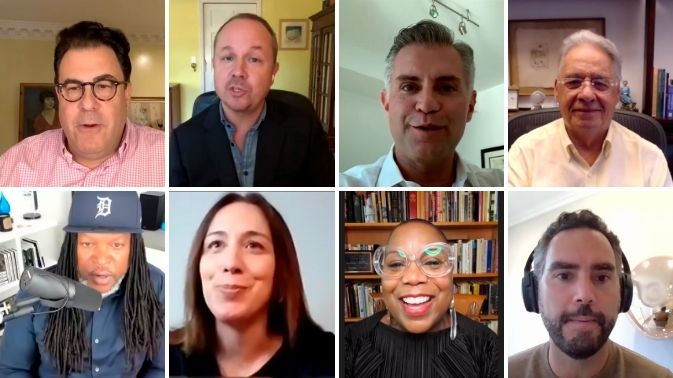In October, the Humanitas360 Institute held its annual meeting of board members from the United States and Brazil, with guest speakers such as writer and American prison system former inmate Shaka Senghor, Argentine politician and former governor of Buenos Aires María Eugenia Vida, and Bertice Berry, a sociologist and lecturer. The meeting was also attended by the advisers Enrique Acevedo, journalist and correspondent of the renowned program “60 Minutes 60 in 6”; Brian Winter, editor-in-chief of “Americas Quarterly”; Alan Fleischmann, CEO of Laurel Strategies, and William Heuseler, head of products and solutions for clients at Itaú Private Bank.
Initially planned to take place in person in the United States, the meeting was held via Zoom due to the pandemic, which allowed a conversation between different countries. Advisors and friends of Humanitas360 from Europe, Latin America and North America attended the meeting, as did chairman of the board Fernando Henrique Cardoso from his home in São Paulo.
Shaka Senghor opened the meeting with a moving speech about how he ended up in prison, and how he met some of the main mentors of his life there. The writer told that in his home — as in many of his acquaintances’ in the community he lived in, a middle-class area in Detroit — there was a lot of physical abuse and beatings by his mother. As a result, expectations about the future — he dreamed of becoming a physician or a doctor — faded away. At school, he suffered from the lack of understanding of teachers and those accountable for the situation he and his brothers lived in. “Expectations regarding children and young people who come from my community are often not filled with empathy in the way young people from other communities are treated,” he emphasized, recalling the differences in treatment between young white and black people.
The former governor of the province of Buenos Aires, María Eugenia Vidal, said that what she learned most during her years of government was to listen to the population, especially those who did not vote for her. Despite her pessimism with the polarized political relations in Argentine society, she emphasized that the perspectives for the future lie in the women of the region: “The female social leaders of all Latin America always give me hope. There is no poor neighborhood in our region without a woman fighting there,” she says. The politician is currently writing a book about what she learned in her years of public management.
Sociologist Bertice Berry, for her part, gave an emotional testimony on how she found herself in sewing and producing pieces for herself, after years of studying and immersing herself in an academic life for her P.h.D. She recalled that the way the Humanitas360 Institute works is connected with this perspective of entrepreneurship through the production of textile pieces, and also spoke about the importance of thinking of a multi-ethnic society as a positive factor. “I studied the idea of colorism in my thesis and realized that this discourse is, in fact, marked by racialized perspectives that come from outside the black community. It is very important to understand the dynamics within the groups in order to understand their relationship with other communities,” she emphasized.
In the second part of the meeting, former President Fernando Henrique Cardoso thanked for the friendly gathering and congratulated the work of the Humanitas360 Institute: “What I can do is make myself available to make your mission grow,” he said. Advisors got to know more about the work done by the H360 during the year and gave insights and perspectives on how to expand the work of the institute. As Alan Fleischmann emphasized, in tune with the meeting’s atmosphere of celebration, congregation and learning: “I would never imagine that an event on Zoom would bring all the passion and emotion that we imagine for the live event.”





